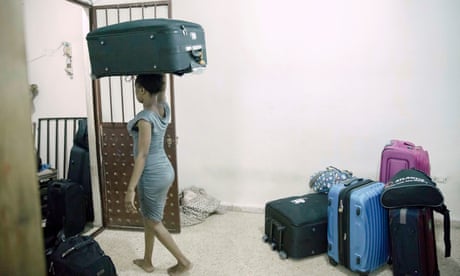Report finds widespread instances of forced labour, with women denied access to passports and subjected to physical or sexual abuse
Oman is failing to protect migrant domestic workers who are victims of human trafficking, trapped in abusive households and subjected to physical and sexual violence with no access to justice or a safe route home, a report has found.
Do Bold, an organisation that works to assist and repatriate migrant workers trapped in the Gulf, interviewed 469 domestic workers from Sierra Leone working in Oman, for the report. It concluded that all but one of the women interviewed were victims of forced labour and human trafficking.
Most of the women interviewed said they had been tricked or deceived by recruiters. Some claimed they had been promised jobs in restaurants and hotels in Europe or the US, while others said they believed they had applied for scholarships to study abroad. They said they were then trafficked into domestic work when they arrived in Oman.
Do Bold said that 80% of the women reported that they worked between 16 and 20 hours a day and 99% had no day off. Almost all (91%) said they had their freedom of movement curtailed, including having their passports confiscated. More than half said they had experienced wage theft, and one-third claimed they had been sexually abused.
Do Bold is calling on Oman to take steps to effectively monitor human trafficking and to allow abused or trafficked migrant workers access to justice.
As in many Gulf countries, it is common for households in Oman to employ live-in maids, typically recruited from low-income countries in Asia and Africa by agencies that can be largely unregulated.
Migrant domestic workers employed in Oman work under the kafala sponsorship system, which ties their legal status to their employer. If a worker breaks the contract and leaves – or runs away, if they are victims of abuse, for example – it is considered a crime and can lead to the worker being jailed.

The report found that fear of punishment deters victims of trafficking and forced labour from attempting to contact the Oman authorities for help.
Adama*, a domestic worker in her 20’s, said she called the Omani police earlier this year after months of physical abuse by her employers, and provided evidence of injuries sustained by being regularly flogged. In an interview for the report, Adama said she told the police she believed her life was in danger and begged to be allowed to return to Sierra Leone.
Adama said that the police visited her at her employer’s home and spoke to the household, but then left without her. As a punishment, she says her employers locked her in a room without food.
Ekaterina Porras Sivolobova, founder and director of Do Bold, said: “For each woman we interviewed, it is a crisis that is significantly affecting their health and wellbeing. It begs the question of what needs to be done to solve this issue.”
The Omani government did not respond to a request for comment.
